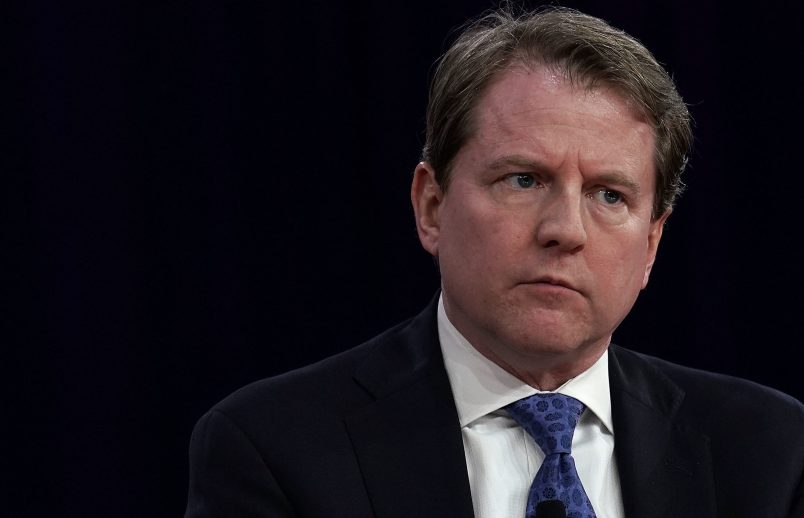A federal judge expressed heavy skepticism of arguments made by theJustice Department Thursday in the House lawsuit seeking the enforcement of its Don McGahn subpoena.
During a nearly four-hour hearing, the administration got major pushback from U.S. District Judge Ketanji Brown Jackson for its arguments on the merits of the case, as well as its claim that the court has no role to play in settling the dispute.
“So what does checks and balances mean?” Jackson asked Justice Department attorney James Burnham during a debate on the latter question, about the court’s ability to resolve the lawsuit. The case being heard predates the current Ukraine-focused impeachment inquiry, but nonetheless stands to have major implications for President Trump’s efforts to stonewall the probe.
The judge started the hearing with a debate over whether the court could wade into the dispute between Congress and the executive branch, before moving on to the merits of the arguments that the Justice Department is making in the litigation. The Department, which is representing McGahn, claims that because he served as a close advisor to the President, he is protected by an “absolute” immunity that prevents the House from enforcing the subpoena.
The Justice Department is also arguing that the court does not even have the authority to settle the dispute between the House and the administration.
Burnham ran into pushback from the judge when he suggested that there were only about three cases in which the House sued the executive branch directly.
“The House is suing Don McGahn!” Brown Jackson said, later adding, “I don’t understand what you mean that the House is suing the executive branch.”
When Burnham argued that the House was seeking testimony about McGahn’s work for the executive branch, he prompted skepticism from the judge as well, who wondered if such an argument “sweeps so broadly” that it would prevent an ex-official from going on TV to discuss his time in the administration.
Before Burnham stepped up to the podium, Megan Barbero argued on behalf of the House. She told the judge that the committee has standing and that the judge had the authority to settle the issue.
“We are not asking the court to tread any new ground,” Barbero said, pointing to cases from the George W. Bush administration and the Obama administration in which Congress asked courts to enforce their subpoenas.
The Justice Department didn’t get more sympathy from the judge when they moved to the merits of their position, that McGahn’s “absolute immunity” trumped the legality of the subpoena.
Jackson wondered why the President couldn’t just assert execute privilege to prevent McGahn from telling Congress things about his work for the President in a way that would be problematic.
That would work for most executive officials, Burnham claimed, but wouldn’t for a small group aides who could be considered the President’s alter-ego, because problematic things still slip by a privilege claim.
The judge noted that, in any case, someone could say something they shouldn’t have said.
“I don’t see that as a basis for … ‘I don’t have to show up,” she said.
The case predates the current impeachment probe into President Trump’s Ukraine conduct, and it arises from the House’s efforts to follow up on special counsel Robert Mueller’s investigation. In the litigation, however, the House is claiming that those efforts were also part of an impeachment inquiry. Either way, the case could have implications for the House’s efforts to enforce compliance of its Ukraine probe subpoenas.
The House subpoenaed McGahn in April, after their voluntary requests that he testify were unsuccessful. He did not show for his scheduled deposition, claiming to be hamstrung by a White House order that he not testify, and discussions with the administration through the summer about accommodating his testimony went nowhere. The Judiciary Committee filed its lawsuit against McGahn in August.
At the end of Thursday’s hearing, Brown Jackson noted that she is about to start presiding over a two-week trial, but that she will do her “best” to turn around a ruling as “quickly as possible.”







I hope that the judge starting the discussion over whether she has authority to intervene is a strong signal that she believes that she does. Because if she does not, we’re in for a civil war between the House and the White House.
So does the vote today change anything? Sounds like not.
Let’s NOT forget that McGahn ushered Kavbeernaugh to the SC!
Addendum:
It seems that the exception in Executive Privilege = Obstruction of Congress/Justice and Illegal Behavior should also apply to Absolute Immunity!
https://www.nationalmemo.com/former-counsel-hicks-cant-claim-absolute-immunity-may-invoke-fifth-amendment/?cn-reloaded=1
Absolute immunity? Not here in 'Murka, bucko!
I’d like to know for real whether McGahn is reluctant to testify under oath and is using DOJ for cover, or if he has a shred of integrity and would like to be honest in the furtherance of justice. I can’t tell which it is.